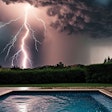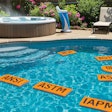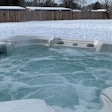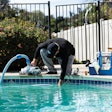As is true of most of our endeavors, the art and science of recreational water treatment becomes more complex and sophisticated as time goes along. Yet for all of the sanitizing, filtration, balance and testing methods at our disposal these days, you don’t really need to know anything about those technologies to know whether or not things are right.
The truth is, we humans are built with all the tools needed to determine there’s some kind of water chemistry issue.
Whether we realize it or not, our eyes, ears, nose, mouth and skin are constantly gathering data, and those natural-born senses are infinitely more sophisticated than man-made information-gathering implements. If we pay attention, we can use these skills to help suss out water chemistry issues.
That may sound overly simplistic, but believe one of the primary obstacles to achieving pristine water conditions is that it’s our nature to learn to ignore what our senses are telling us. It happens in an infinite number of ways for different reasons: pushing aside your back pain to get your work done, averting your eyes when you drive by a neighbor’s house who never cleans the piles of trash on the lawn, tuning out traffic noise so you can sleep or learning to ignore unpleasant smells you routinely experience — like the chlorine stench at your community center pool.
As the cliché goes, the first step in fixing a problem is realizing you have one. In the realm of all things aquatic, that means first paying attention to your senses. It works when things are awry and also to help confirm when the water is dialed in. As problem-solving tools, our senses lead us to the trailheads. They point us in a direction that will make the use of test kits and other diagnostic methods more efficient and effective.
With that in mind, let’s look at the sensory tool belts most of us walk around with from time we’re born.
Sight
This one is easy. If the pool water is not clear, if there is visible dirt and debris floating in the water or on the pool floor, if there are dead bugs (or live ones in and around the water), if there’s trash on the deck — these all are indications of various chemistry issues. The same is true for visible corrosion, staining, scale or rust on surfaces and components. If you see inhalers all over the pool deck because kids are having trouble breathing, and for heaven’s sake, if a pool light is flickering, these are powerful warning signs that something is wrong. Bottom line: don’t ignore what you see.
RELATED: Indoor Pools: How to Clear the Air and Help Swimmers Breathe
Sound
This is a little more tricky. Pool systems are, or at least should be made to run silently, so when you hear louder than usual mechanical noises coming from the equipment, it’s almost certainly time for a service call with a qualified technician. Some noise is normal so you need to become accustomed to the sounds of the system operating properly.
But there’s another level that is all about hearing what people say about their experience. And that’s where the lost art of listening really comes into play. I’m always impressed with the way children pick up on things that us grown-ups sometimes miss. When it comes to conditions in an aquatic facility, indoors or outside, it pays to listen to what they tell you about the experience. Phrases like “It stinks,” “My eyes burn,” or “My skin itches,” are powerful indicators that should trigger the savvy pool operator or water quality professional to suspect elevated levels of disinfection byproducts, and sanitizer demand that is out running the treatment method. Kids are like little canaries in coalmines, especially in pools because they are very sensory oriented. They have less cluttered mines and walk around with less developed social filters, i.e. they say what they experience.
Smell
Right there with sight, this is the easiest to grasp, even though it’s the sense that most of us probably use the least, (except maybe around dinnertime). When you or others get a whiff of the familiar chloramine smell, the water needs help. It could be that the smelly vessel is being refilled with source water that’s treated with monochloramine, or the system simply isn’t keeping up with sanitizer and oxidation demand, or a combination of both.
The facility might need a completely revamped treatment system, perhaps turning away from chlorine-only treatment to incorporate ozone and/or UV technology. Or there could be other measures, such as paying more attention to kids showering prior to entering the water, or encouraging bathroom breaks. Whatever the type of remediation, staring down that path often first goes through the nose.
Touch
Pool surfaces and components are created to be smooth and easy on the skin. If you find rough patches on the surface or abrasive edges on components like rails or ladders, something’s not right.
Touch certainly comes into play after you get out of the water, as well. Dry, rough or itchy skin, or red and burning eyes, should never be part of the aquatic experience.
On a more serious note: If someone feels any level of electrical shock, it’s time to close the pool and carefully inspect the electrical service, bonding and grounding connections.
RELATED: How to Test a Swimming Pool Bonding Grid
Touch also works on an entirely different level, one that I personally suspect might be at least part or maybe even entirely psychological. Many of my clients have reported they love the way the water feels, that there’s a perceptible quality to the texture, which enhances their enjoyment. Although I love hearing those remarks because it means they’re having a positive experience, I don’t honestly know if different treatment methods create different types of “texture” in the water.
I do suspect that when water is clean, properly sanitized and balanced, when it’s odorless and tasteless, when it’s a comfortable temperature and, most of all, when it looks beautiful, there are no distractions to one's enjoyment. I liken it to the way a freshly cleaned car seems to run better. We know rationally that the car doesn’t run differently because it’s been detailed, but when it’s looking spiffy and smelling fresh, we often get the feeling the ride is a little smoother as well.
Is that naiveté or simply the nature of sensory experience? Our mind processes the information we receive through our senses and forms an impression of the experience we’re currently experiencing. Does water that’s treated perfectly actually feel different or do some people just think it does? Frankly, I’m not sure it really matters. What does matter is that the people who turn to the water for health and recreation walk away feeling refreshed, relaxed and rejuvenated.
For those of us who spend our time making sure that’s what happens, it only makes sense to start in the realm of the senses.











































